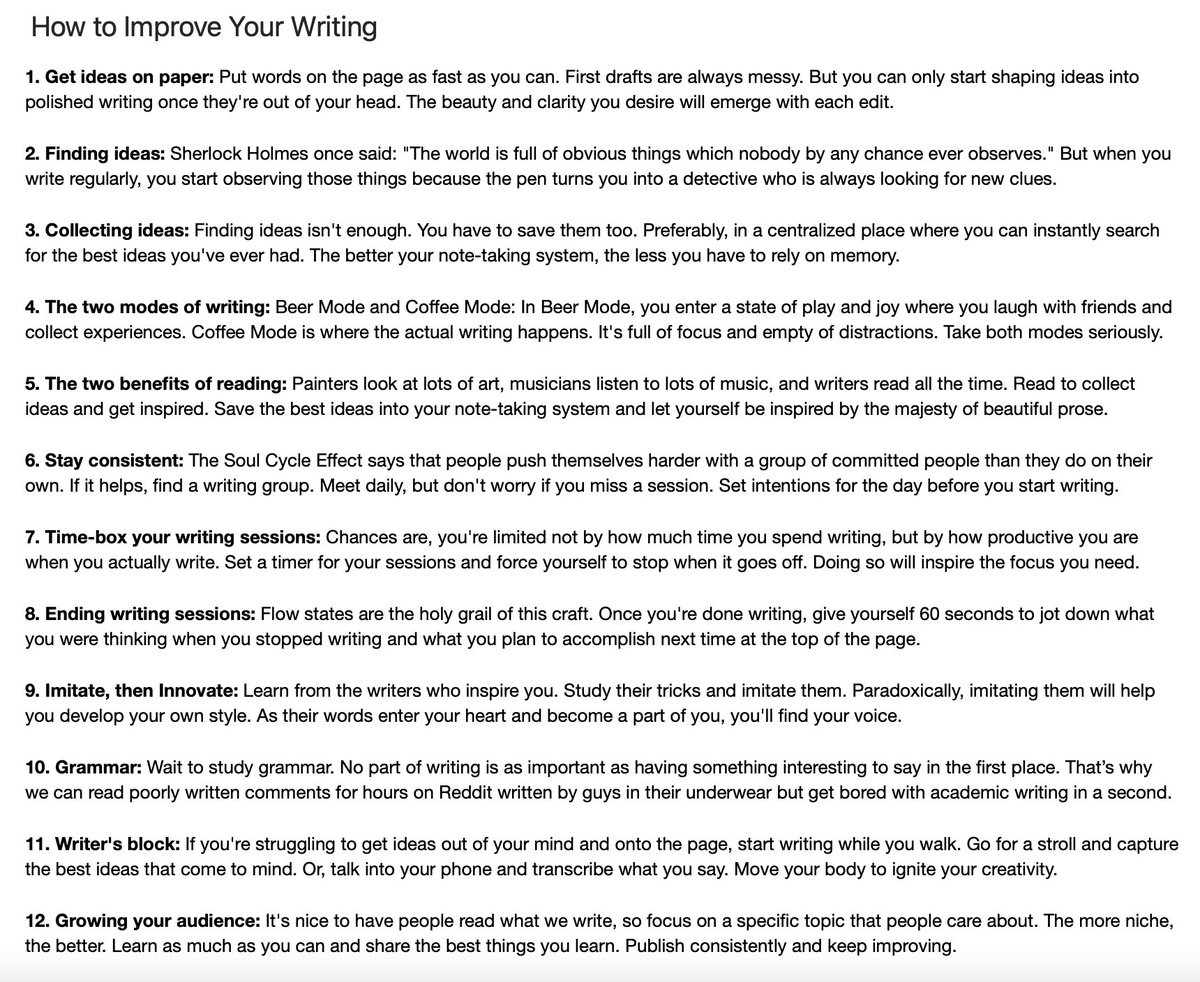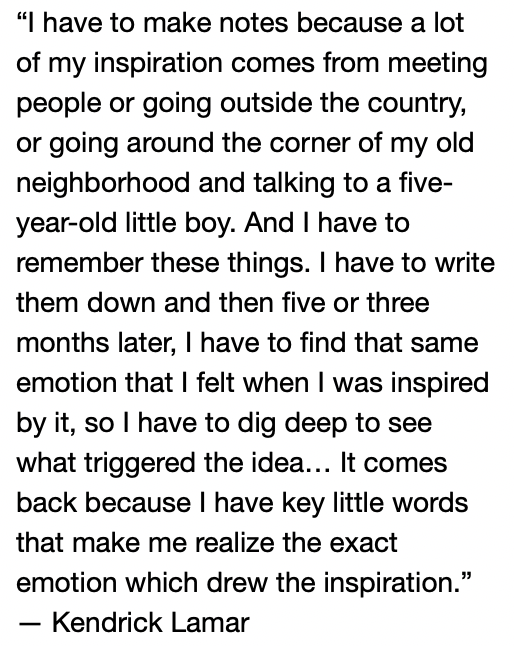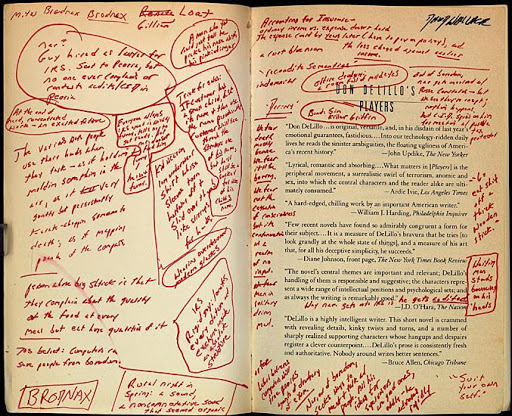 menu
menu menu
menu

 David Perell @david_perellIf you want to improve your writing, start by becoming a better note-taker.
Here are 10 ways to do that:
1. Save only the best notes: Don't hoard information. Save your top 5-10% of ideas only. That way, you can trust that everything in your note-taking system is high-quality. twitter.com
David Perell @david_perellIf you want to improve your writing, start by becoming a better note-taker.
Here are 10 ways to do that:
1. Save only the best notes: Don't hoard information. Save your top 5-10% of ideas only. That way, you can trust that everything in your note-taking system is high-quality. twitter.com David Perell @david_perellCreatives have two kinds of working:
1) Beer mode: A state of unfocused play where you discover new ideas.
2) Coffee mode: A state of focused work where you grind towards a specific outcome.
You find ideas in Beer mode and implement them in Coffee mode. twitter.com
David Perell @david_perellCreatives have two kinds of working:
1) Beer mode: A state of unfocused play where you discover new ideas.
2) Coffee mode: A state of focused work where you grind towards a specific outcome.
You find ideas in Beer mode and implement them in Coffee mode. twitter.com David Perell @david_perellWhenever you stop writing, leave yourself a 100-word note at the top of the page.
Here’s what to write:
• Where you’re stuck
• What to work on next time
• What you were thinking about when you stopped writing
The short notes makes writing easier when you return to the page. twitter.com
David Perell @david_perellWhenever you stop writing, leave yourself a 100-word note at the top of the page.
Here’s what to write:
• Where you’re stuck
• What to work on next time
• What you were thinking about when you stopped writing
The short notes makes writing easier when you return to the page. twitter.com David Perell @david_perellThree words to improve any skill: Imitate, then innovate.
Find your favorite creators, copy their style, and you'll eventually develop your own.
Here's my mini-essay. twitter.com
David Perell @david_perellThree words to improve any skill: Imitate, then innovate.
Find your favorite creators, copy their style, and you'll eventually develop your own.
Here's my mini-essay. twitter.com David Perell @david_perellThe Internet rewards unique people.
Find your unique combination of skills, interests, and personality traits.
I call this a Personal Monopoly.
Become the only person in the world who does what you do.
Then, tell the world by sharing your knowledge. twitter.com
David Perell @david_perellThe Internet rewards unique people.
Find your unique combination of skills, interests, and personality traits.
I call this a Personal Monopoly.
Become the only person in the world who does what you do.
Then, tell the world by sharing your knowledge. twitter.com

With a well-designed bookmarks tab, Twitter can become Pinterest for ideas
 David Perell @david_perell9. Writing online will accelerate your learning.
Don't wait until you're an expert to write online. Writing online will force you to learn as much as you can and distill your best ideas for public consumption. And as you write online, you'll build authority in your niche. twitter.com
David Perell @david_perell9. Writing online will accelerate your learning.
Don't wait until you're an expert to write online. Writing online will force you to learn as much as you can and distill your best ideas for public consumption. And as you write online, you'll build authority in your niche. twitter.com David Perell @david_perell5. Build a Shared Knowledge Base
We keep all of our Standard Operating Procedures in @NotionHQ. We get everything in detailed writing whenever we meet, so we can trust a central source of truth in the future. Long-term, we save ourselves time and eliminate confusion. twitter.com
David Perell @david_perell5. Build a Shared Knowledge Base
We keep all of our Standard Operating Procedures in @NotionHQ. We get everything in detailed writing whenever we meet, so we can trust a central source of truth in the future. Long-term, we save ourselves time and eliminate confusion. twitter.com
 David Perell @david_perellFor years, I did most of my reading on Kindle. But now I read physical books. I use @readwiseio to save highlights by taking a picture of the text I want to save, which automatically goes into my Second Brain.
Here's what my workflow looks like. twitter.com
David Perell @david_perellFor years, I did most of my reading on Kindle. But now I read physical books. I use @readwiseio to save highlights by taking a picture of the text I want to save, which automatically goes into my Second Brain.
Here's what my workflow looks like. twitter.com




 David Perell @david_perell2. Start taking notes early, so you can build upon the ideas over time.
Kendrick was a shy middle schooler who sometimes spoke with a stutter. Frustrated, he turned to the written word. He scribbled rap lyrics on notebook paper instead of finishing assignments for other classes. twitter.com
David Perell @david_perell2. Start taking notes early, so you can build upon the ideas over time.
Kendrick was a shy middle schooler who sometimes spoke with a stutter. Frustrated, he turned to the written word. He scribbled rap lyrics on notebook paper instead of finishing assignments for other classes. twitter.com Pay what you can
Pay what you can